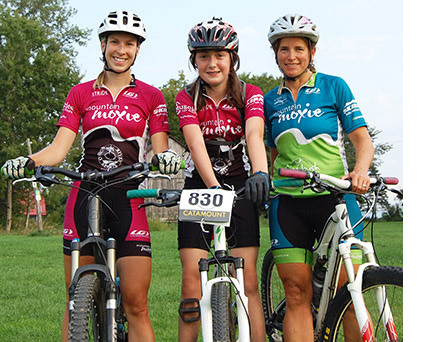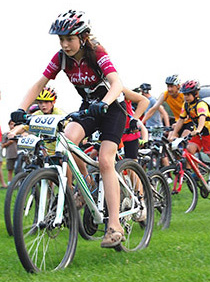| Ride On! Women and Girls Race Mountain Bikes | |||||||
| by Sarah Galbraith | |||||||
|
Standing at the top of a down-sloping rock is one thing. That same view from a bike seat—is entirely another. A rider must assess the path ahead and run through a checklist of pointers: Chin up, elbows out, stand up on the pedals, eyes ahead, weight back. The list goes on. There are risks in mountain biking.
But in fact, Vermont’s women riders are well prepared for rocks in the trail, with a growing roster of programs that support girls’ and women’s mountain bike skills. Mountain biking is the second most popular trail activity nationally, after hiking. And it’s fun, as evidenced by the nearly 40 million national participants each year, according to statistics collected by the Outdoor Foundation. The risks are outweighed by benefits like fitness, fresh air, nature, and community.
Thousands of Vermonters mountain bike, though the actual number is hard to get at, with estimates ranging from a few thousand to 50,000. “The value is huge,” says Craig Whipple, Director of State Parks. |
||||||
| “Mountain biking, hiking, and birding are all opportunities for people to get out of doors and connect with nature. Trails provide the doorway to that environment. It’s well-documented that it’s good for our health.” Vermont offers something for every rider, including beginners, families, and kids.
Our well-built trails are an important draw for tourists, too. East Burke’s Kingdom Trails, an award-winning network for all ability levels, and just one of many places to mountain bike in the state, had over 60,000 visits last year. And all of these cyclists like to spend money. A 2010 study conducted by the Outdoor Foundation showed that cyclists (mountain and road combined) contribute $133 billion to the U.S. economy annually. They support nearly 1.1 million jobs across the country. “Mountain biking is potentially the next really big boon for tourism in the state,” says Megan Smith, Vermont’s Commissioner of Tourism and Marketing. “It’s an exciting opportunity because it’s family, it’s a younger demographic, and these people will keep coming back,” she says.
Now going into its fifth year, Mountain Moxie has so far supported 43 women in mountain bike racing by providing skills clinics, training opportunities, deals on gear, and a team kit. Importantly, these women also benefit from the encouragement that comes from being part of a team.
After receiving so much from the sport, Ault wanted to give back to the Vermont mountain biking community. Team members were already helping out with volunteer trail-building efforts and playing roles in their local mountain bike clubs. But the team wanted to add a community focus on getting more girls into mountain biking. Collaboration among Mountain Moxie, Little Bellas (a metoring program), and the Stride Foundation, with support from Catamount Outdoor Family Center, led to the creation of Moxie Sparks, a bike mentoring scholarship program for girls. “It’s not just about riding, training, and racing, but also about creating greater access to the sport for women and girls,” she says. Vermont girls had mountain bike programs through the sixth grade, but many of the girls weren’t sticking with the sport as they got older. Mountain Moxie works with the Williston school system to select two girls each year for the scholarship and mentorship program, and sets them up to be life-long riders. Moxie Sparks is supported by team mentors. Girls participate in fun-rides and races at Catamount Outdoor Family Center and with the Little Bellas’ Sunday evening six-week summer camp. The scholarship provides girls with bikes and gear, technical skills and personal empowerment through participation in the Little Bellas program, while mentorship from Mountain Moxie team members model their love for riding and racing. To-date, four girls have participated in the program, with two new girls joining every year since the program’s inception.
Wright points out the short-term benefits to girls participating in Moxie Sparks, like improved confidence and health. “It's been amazing to watch girls transformed through Moxie Sparks,” she says. Mountain Moxie team member and Spark mentor Julia Sperry agrees, and describes how one Moxie Spark started out tentative and nervous in her riding, but advanced to an energized and thrilled rider, who was participating in races on her own. Sperry even heard that this girl wore her team jersey to the first day of school. “And she was so proud of her new bike,” says Sperry. Wright also points out the long-term gains from a program like this, like a decreased instance of chronic disease and the 80 percent of women executives surveyed by the Women’s Sports Foundation, who reported playing sports. Mountain bike racing is a demonstration of character and grit, which can be an advantage in the job market. Meghan Smith, a New England-based mountain bike racer and former Mountain Moxie member (and not the Vermont Commissioner of Tourism and Marketing by that name quoted earlier), says including racing on her resume helped land her current job. “I asked my interviewers why they were interested in me,” she says. “They said that being an athlete and racer showed I was able to set a goal and see it through.” With the skills acquired through mountain biking, plus increased health, confidence, determination, and a supportive network, women mountain bikers become a powerful force. As is evidenced by Mountain Moxie, when women build trails, participate in local mountain bike clubs, mentor younger riders, and invite their friends to go riding, they can change the landscape of an entire sport, one woman at a time.
|
|||||||
| Sarah Galbraith of Marshfield is an avid cyclist, skier, and hiker. She covers outdoor topics as a freelance writer.
|
|||||||


